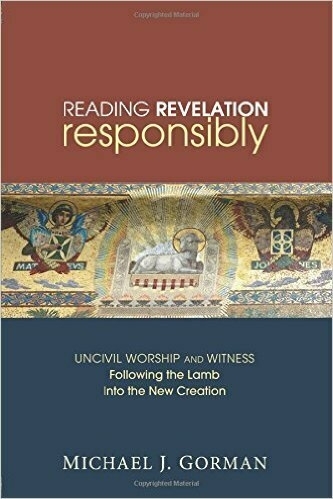Reading Revelation Responsibly by Michael J. Gorman
We’ve been in a sermon series on Revelation at church, so when a couple recommendations for Reading Revelation Responsibly came across Twitter, I had to pick up a copy. Dr. Michael J. Gorman, the author, is a United Methodist professor of Biblical Studies and Theology at the very Roman Catholic St. Mary’s Seminary and University in Baltimore, Maryland.
Gorman makes the case that the book of Revelation is a book of prophecy, but, he says,
prophecy, in the biblical tradition, is not exclusively or even primarily about making pronouncements and predictions concerning the future. Rather, prophecy is speaking words of comfort and/or challenge, on behalf of God, to the people of God in their concrete historical situation.
Gorman suggests that Revelation encourages the church to resist the allure and pressure of un-sacred civil religion.
Calling Revelation “resistance literature” is appropriate because one of the primary prophetic purposes of Revelation is to remind the church, both then and now, not to give in to the demands or practices of a system that is already judged by God and is about to come to its demise.
One is reminded of N. T. Wright’s line that saying ‘Jesus is Lord’ was (is) a political statement, because if Jesus is Lord, then Caesar is not. Gorman argues that this un-sacred civil religion is similarly prevalent in modern America as it was in ancient Rome. As such, he says, the lesson for the church today is to resist the call of our civil (political) religion, because it will undoubtedly conflict with our call to follow Jesus.
The early church had a natural suspicion of Roman civil religion because it was so blatantly pagan and idolatrous—though even it could be appealing. Contemporary Christians can much more easily assume that Christian, or quasi-Christian, ideas, language, and practices are benign and even divinely sanctioned. This makes American civil religion all the more attractive—that is, all the more seductive and dangerous. Its fundamentally pagan character is masked by its Christian veneer.
What becomes clear from Gorman is how timely the message of Revelation is for us today. Not because it is giving us some sort of end-of-days timeline, as the popular dispensational position would claim, but because it calls us to recognize the danger of buying in to any empire or lord except Jesus and His kingdom. Our systems of government and power today are modern representations of Babylon.
Babylon makes promises, demands, and claims that are appropriate only for God to make. It sacralizes, even divinizes, its own power, and then it requires absolute allegiance to that power. The progression of this course, as Revelation 18 makes especially clear, is the pursuit of luxury and the neglect of the poor, first by Babylon itself, then by its clients, then by its everyday citizens. One inevitable result is the treatment of certain human beings as goods to be traded (18:13), and the elimination of others for their failure to offer absolute allegiance. Another is violence and war, death and destruction, hunger and famine (ch. 6). The final inevitable result is the destruction of the earth without fear of consequences, temporal or eternal (11:18).
(I think Gorman has also probably read his Stringfellow - I’m reminded of reading An Ethic for Christians and Other Aliens In a Strange Land a few years back.
I’d highly recommend Reading Revelation Responsibly for anyone who wants to give Revelation serious consideration. It’s not a difficult book - 10 chapters, and written at what might be considered just a slightly advanced popular level. It’s an insightful, encouraging volume that’s worth the time.
